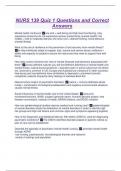NURS 139 Quiz 1 Questions and Correct
Answers
Mental health continuum ✅one end = well-being and high level functioning, may
experience stress but do not experience serious impairments (mental health); the
middle = mild to moderate distress; the other end = altered thinking, mood behavior
(mental illness)
What is the role of resilience in the prevention of and recovery from mental illness?
✅to help individuals adapt to tragedy, loss, trauma and severe stress; resilience =
ability and capacity for people to secure the resources they need to support their well
being
How does culture influence the view of mental illnesses and behaviors associated with
them? ✅across different cultures you will find different definitions of mental health and
mental illness; culture bound syndrome = disorders seen in some culture but not others
(ex: anorexia is common in US, Europe and Australia but unheard of in other countries,
hwa-byung and neurasthenia have similarities to depression, prominent somatic
complaints, patients frequently deny feelings of sadness Book 84)
Nature/nurture origins of psychiatric disorders. ✅(nature + nurture) diathesis-stress
model = combination of biological predisposition and negative environmental stressors
causes mental illness
Social influences of mental health care in the United States: ✅consumer
movement/recovery, NAMI, surgeon generals report, humane genome project, new
freedom commission, institute of health, BRAIN initiative, and RDOC initiative
How can epidemiological studies improve medical and nursing care? ✅epidemiologists
of mental disorders study the distribution of mental disorders in order to identify high-
risk groups and high-risk factors and common signs and symptoms appearing together
How is the Diagnostic and Statistical Manual, fifth edition (DSM-5), used for diagnosing
psychiatric conditions? ✅The DSM-5 identifies disorders based on specific criteria so
plan of care can be established
Describe the specialty of psychiatric-mental health nursing. ✅-promote mental health
through ADPIE
-use nursing, psychosocial, neurobiological theories and research
-variety of settings and population
, Similarities and differences between DSM-5 medical diagnosis and a nursing diagnosis:
✅a nursing diagnosis is a clinical judgement concerning a human response to health
conditions/life processes, or vulnerability for that response by an individual and provide
frame work for identifying appropriate nursing interventions whereas the DSM-5 is used
to diagnose a mental disorder
Future challenges and roles of mental health care in the United States: ✅education ( of
patients and nurses), aging population (physiological issues as well as mental), cultural
diversity, science, technology, electronic healthcare, patient advocacy, legislative
involvement
Direct and indirect advocacy opportunities for psychiatric-mental health nurses.
✅continues to evolve; advocate through direct/indirect care
-report
-uphold confidentiality
-support pt's right to make decisions
Indirect: member of associations, review legislation
Describe the evolution of theories of psychiatric disorders: ✅first: met physical needs
of pts-give meds, monitor sleep, activity, nutrition, hydration, elimination
Focus: qualities of therapeutic relationships, understanding pts perspective,
communicating in a way to facilitate pts recovery
Theorist
Distinguish between dominant theories and associated therapies for psychiatric
alterations. ✅-Psychoanalytic theory and psychodynamic therapy
-interpersonal theory and therapy, Peplau's theory of interpersonal relationships
-(behavioral): classical conditioning theory, behavioral theory, operant conditioning
theory, behavioral therapy
-(cognitive): rational-emotive therapy, cognitive-behavioral therapy
-(humanistic): theory of human motivation
-biological model and therapy
-(developmental): cognitive development, theory of object relations, theory of moral
development, ethics of care theory
Describe psychoanalytic theory ✅(Freud) focuses on here and now; transference and
countertransference
Levels of awareness:
-conscious=what we are thinking/experiencing at any given moment
-preconscious=memories, knowledge
-unconscious= thoughts, desires, impulses that we are unaware of (largest level)
Personality structure:
Id= pleasure reflex action
Ego= problem solver, reality tester
Superego= moral component (based on what is socially acceptable)




